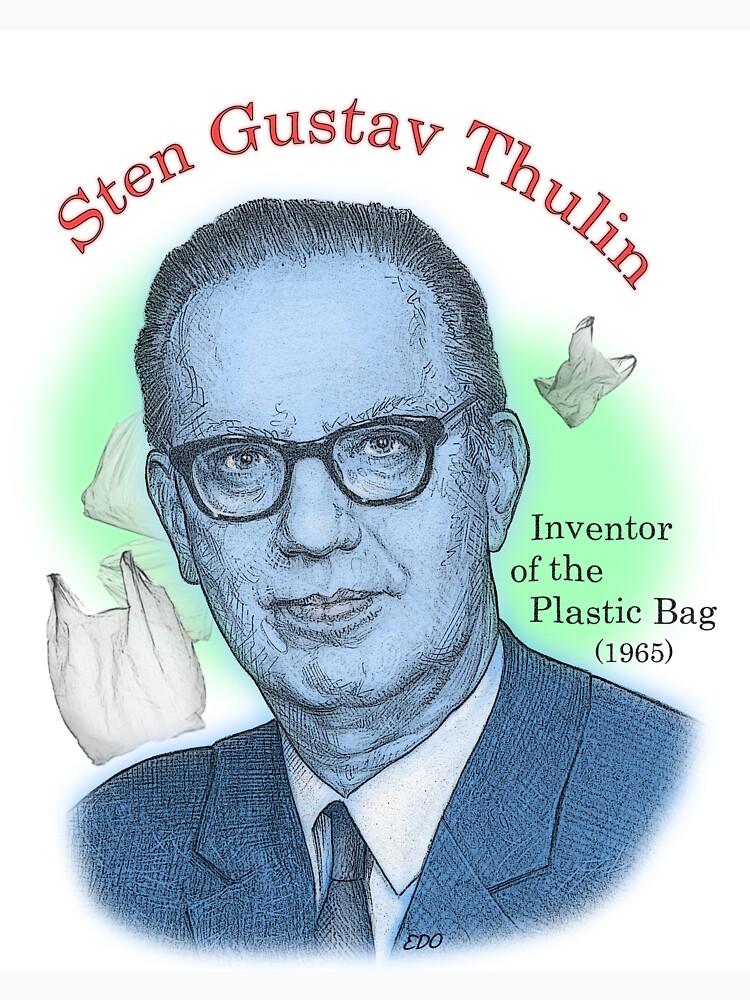Who Invented Plastic Bags?
Sten Gustaf Thulin, a Swedish engineer, invented the modern-day plastic bag in 1965. Thulin officially introduced the bag to the world after a packaging company he worked for, Celloplast, made it available to the marketplace.
Believe it or not, Thulin created the plastic bag to help the environment! At the time, paper bags were the bag of choice. This meant tons of trees were getting chopped down just so people could bring their items home from the store, and then they’d toss the bag in the garbage. Thulin was deadset on creating an alternative that people could use again and again. And thus, the plastic bag was born!
“To my dad, the idea that people would simply throw plastic bags away would be bizarre. It was very much an improvement on what was there before.”
Raoul Thuln (son of Sten Gustaf Thulin) in an interview with the BBC
Did You Know?
Sten Thulin always carried a folded plastic bag in his pocket. Any time he went to the store, he would reuse them!

Where Did Plastic Bags Originate?
Plastic bags first originated in Sweden after an engineer patented the design. While you might think this would mean that Sweden became a plastic bag-making powerhouse, that wasn’t the case! It wasn’t until Mobil Chemical made their own bag in the United States that plastic bags started getting mass produced.
Even after plastic bags were first introduced, they weren’t a hit among grocery store workers. Static would cause the bags to stick together, which meant it took more time for employees to bag groceries. After workers got used to opening them and incorporating them into their routine, the bags became more popular. Sometimes it just takes a little persistence!
Did You Know?
Plastic bags have a much lower carbon footprint than paper bags!

Why Did We Start Using Plastic Bags?
We started using plastic bags in the 1980s because they were cheaper than paper bags. Shoppers also preferred plastic bags because they had handles, something paper bags didn’t offer at the time.
Between the savings they offered for grocery chains and the added convenience for consumers, the choice was clear: Plastic bags were the better option!

Why is There a Plastic Bag Ban?
There is a ban on plastic bags in certain areas of the United States because of the impact they can have on the environment. Not only do plastic bags take up space in landfills, but they can also harm wildlife.
Not all plastic bags are included in statewide bans, however. For example, even though New York announced plans to ban plastic bags, they’re making exceptions for takeout, food delivery, prescription drugs, and more. Plastic bags are more sanitary than reusable ones, so it’s best to put items like raw meat or medication in these bags versus tote bags.

Can You Advertise on Plastic Bags?
When you go to Jewel-Osco, Meijer, Whole Foods, Target, Walmart, and many other grocery stores, you end up going home with promotional plastic bags. These retailers print their logo on their bags as a way to increase brand impressions.
Of course, many stores are transitioning from plastic bags in favor of reusable grocery totes. ALDI, for instance, doesn’t offer plastic at all and instead asks customers to bring in their own shopping bags.

What Does the Future Hold for Plastic Bags?
Even though the COVID-19 pandemic has sparked a resurgence in plastic bag usage, it’s likely that single use bags won’t be used at grocery stores as much as they used to be. However, businesses like restaurants, pharmacies, and meat markets will likely continue to use plastic bags for the sake of cleanliness and convenience.
Reusable bags are great for quick trips to the grocery store, but you likely won’t see restaurants putting to-go orders in them anytime soon. For now, plastic bags still have a part in our day-to-day lives!
The Bottom Line
Without plastic bags, ordering takeout and running to the drugstore just wouldn’t be the same. They make our shopping trips convenient and safe! We may not know what the future exactly holds for plastic bags, but without the important role they played in our history, we wouldn’t be where we are today.

